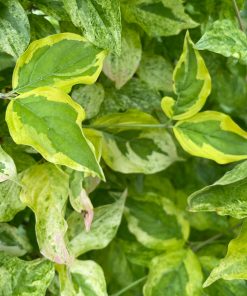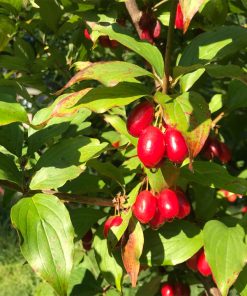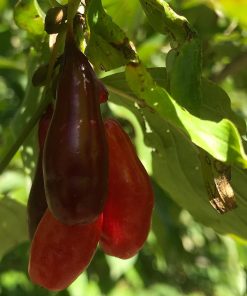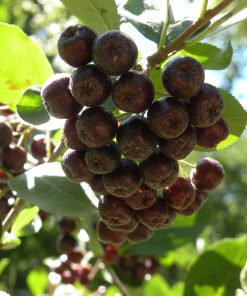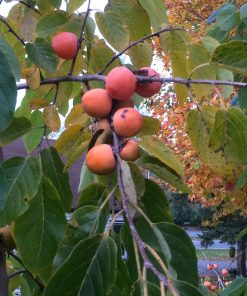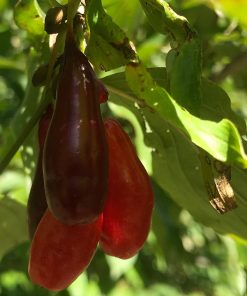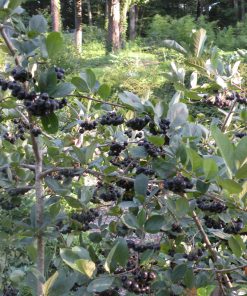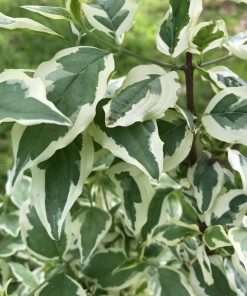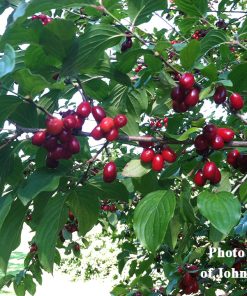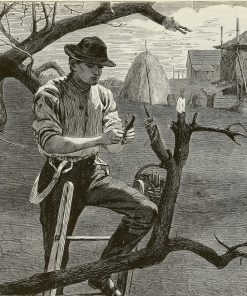Mespilus, ‘Sultan’ medlar Cricket Hill Garden
$ 42,00 $ 25,20
Mespilus germanica
Variety description: This large fruited variety of medlar is from the Netherlands. It bears an abundant crop of 1 1/2″- 2” diameter fruit. Fine textured and sweet when fully ripe, these fruit are great for sauces and preserves.
Medlars are close relatives of hawthorns and are native to southeastern coastal regions of the Mediterranean and southwestern Asia. Medlars have at least a thousand year long cultivation history over a wide region stretching from Iran to England. Charlemagne dictated that medlars be planted in all of his royal estates, while Shakespeare referenced the fruit is several of his plays.
The odd shaped, green-brown fruit looks like a large crab apple with its bottom end open rather than spherical. The fruit should be picked after the first hard frost. At this point it will still be hard and unpleasant. In order to ripen or “blett” the fruit, it is stored in a cool, dry place until the pulp softens and turns a light brown. Ripe medlars are quite delicious, with a flavor similar to spicy apple sauce.
The English scholar and wine connoisseur George Saintsbury wrote in his classic Notes on a Cellar that “the one fruit which seems to me to go best with all wine, from hock to sherry and from claret to port, is the Medlar – an admirable and distinguished thing in itself, and a worthy mate for the best of liquors.”
Medlars grow into attractive small trees which are covered in soft pink-white flowers in the spring. Fall foliage is quite attractive, with the leaves turning hues of golden red and orange. Medlar’s are self-fertile.
Site requirements: Full sun location. Medlars will grow in a range of soil types provided the planting location is well drained. Soil pH of 6.5 is ideal. Will grow to 8-10‘ tall.
Hardiness: USDA zones 4-9.
Plant size: Tree,1-2′ tall with strong central leader.
When we ship:
Fall 2023 / Spring 2024
Shipping restrictions: Cannot ship to Canada.
Fast Shipping and professional packaging
We offer a wide range of shipping options due to our long-standing partnerships with UPS, FedEx and DHL. Our warehouse staff will package all goods to our exacting specifications. Prior to shipping, your goods will be thoroughly inspected and secured. We ship to thousands customers every day across multiple countries. Our commitment to become the biggest online retailer around the globe is evident by this. The warehouses are located situated in Europe in the same way as they are in USA.
Orders with more than one item are assigned processing times for each item.
We will carefully examine all items ordered before shipping. The majority of orders are delivered within 48 hrs. The delivery time will be between 3-7 days.
Returns
Due to multiple entities which include the factory as well as the warehouse, we cannot effectively manage inventory. The stock levels may fluctuate at any time. It is possible that your order may be out of stock once your order has been made.
Our policy is for 30 days. If 30 days have gone without a trace since the purchase however, we're unable to give you a return or exchange.
The item must not be used, and it must be in the original packaging. It should also be returned in its original packaging.
Related products
Landscape edibles
Landscape edibles
Landscape edibles
Cudrania, ‘Darrow’ seedless female Che Chinese Melonberry SPRING 2025 PRE-ORDER Cricket Hill Garden
Landscape edibles
Landscape edibles
Landscape edibles
Landscape edibles
Landscape edibles
Landscape edibles
Elaeagnus multiflora, ‘Sweet Scarlet’ Goumi SPRING 2025 PRE-ORDER Cricket Hill Garden
Landscape edibles
Cydonia oblonga, ‘Meech’s Prolific’ Quince Cricket Hill Garden
Landscape edibles
Landscape edibles
Asimina triloba, Cricket Hill Garden Select Pawpaw Cricket Hill Garden
Landscape edibles
Cornus, open-pollinated seedling of ‘Elegant’ Cornelian Cherry Cricket Hill Garden
Landscape edibles
Cudrania, ‘Daniecki’ male Che Chinese Melonberry SPRING 2025 PRE-ORDER Cricket Hill Garden
Landscape edibles
Aronia melanocarpa, ‘Viking’ SPRING 2025 PRE-ORDER Cricket Hill Garden
Landscape edibles
Cudrania, ‘Darrow’ and ‘Norris’ female COMBO tree Cricket Hill Garden
Landscape edibles
Landscape edibles
Landscape edibles
Landscape edibles
Landscape edibles
Landscape edibles
Landscape edibles
Cydonia oblonga, ‘Bourgeault’ Heirloom French Quince Cricket Hill Garden
Landscape edibles
Aronia melanocarpa, ‘Nero’ SPRING 2025 PRE-ORDER Cricket Hill Garden
Landscape edibles
Landscape edibles
Landscape edibles
Landscape edibles
Landscape edibles



